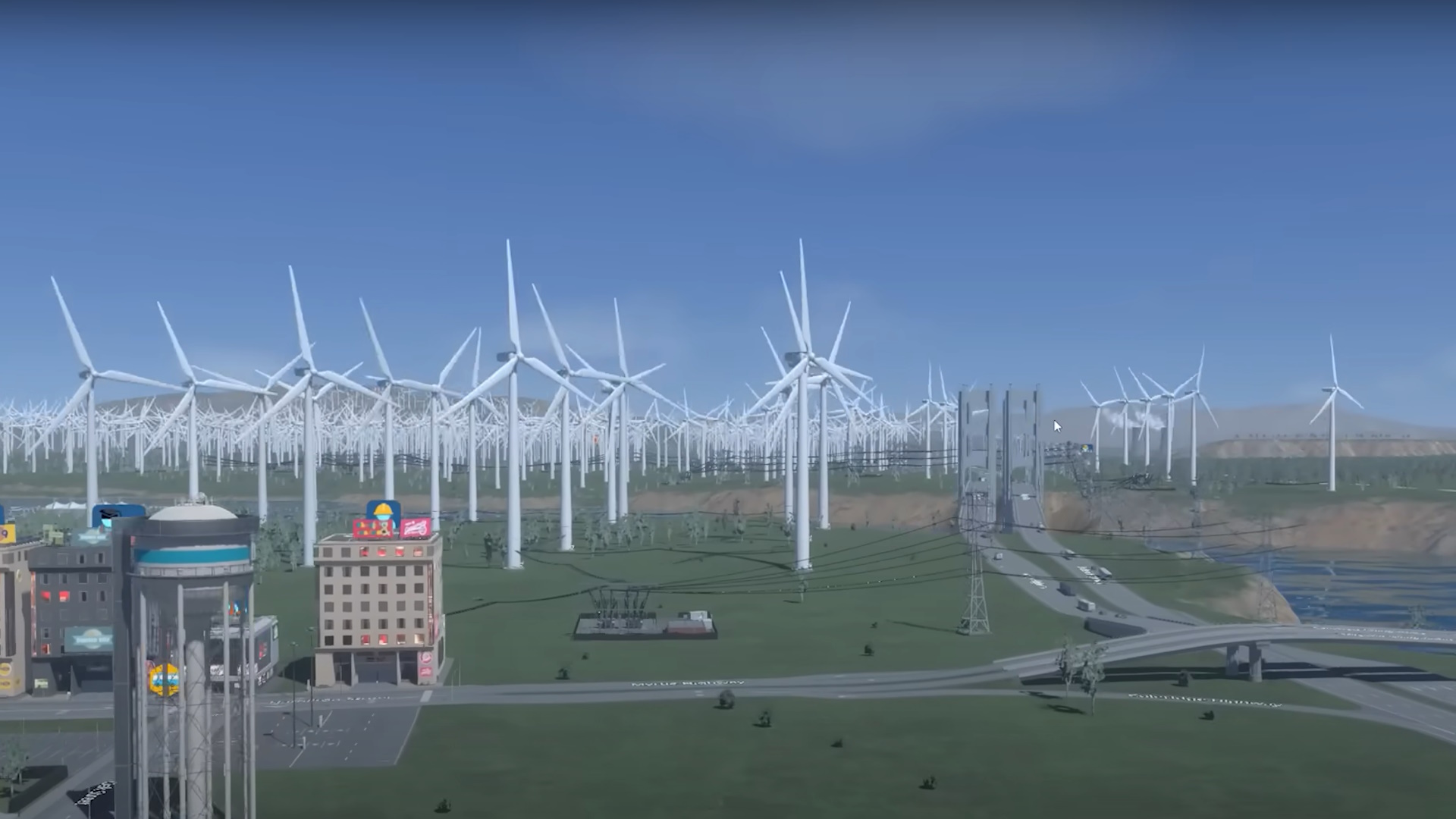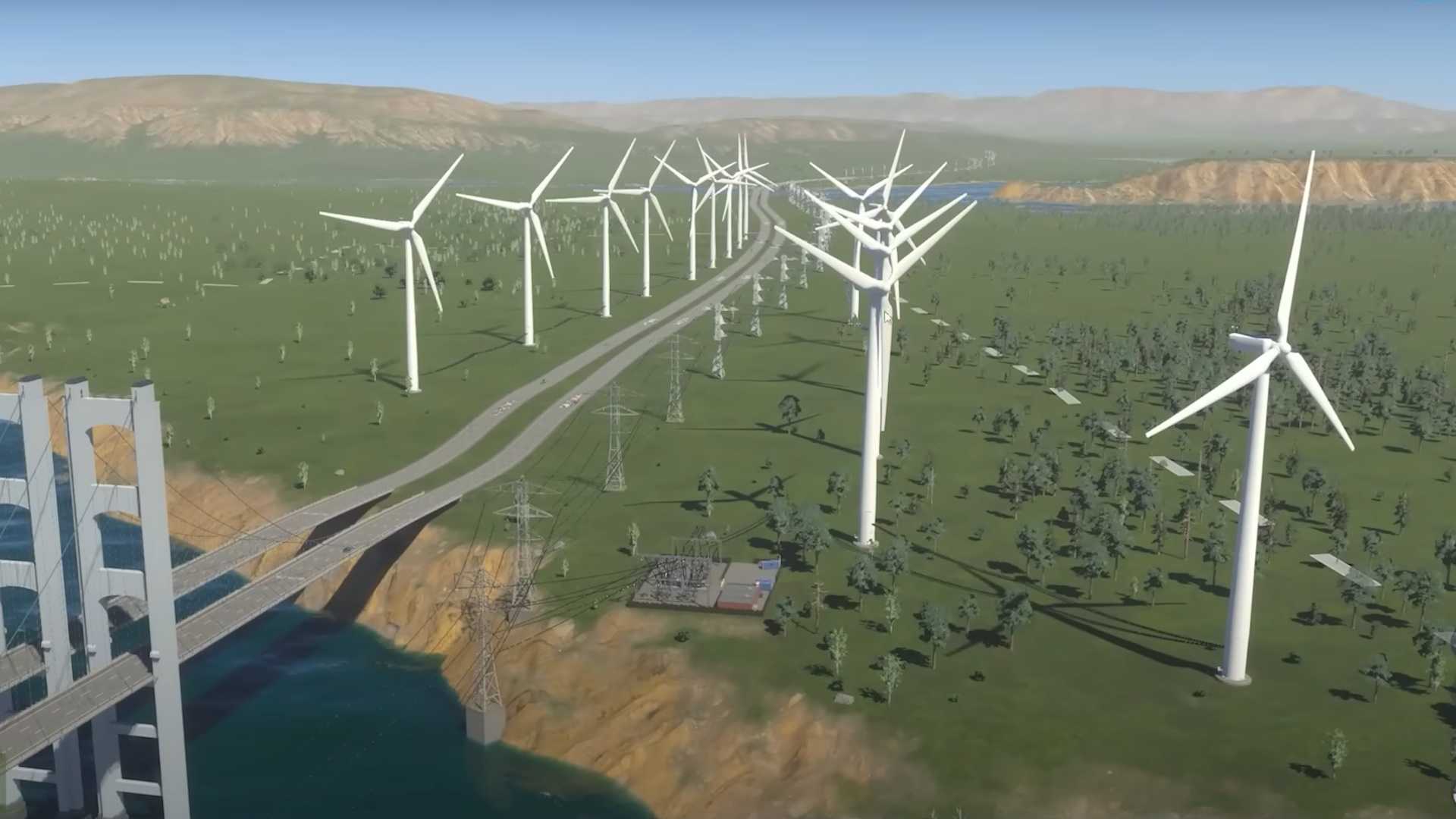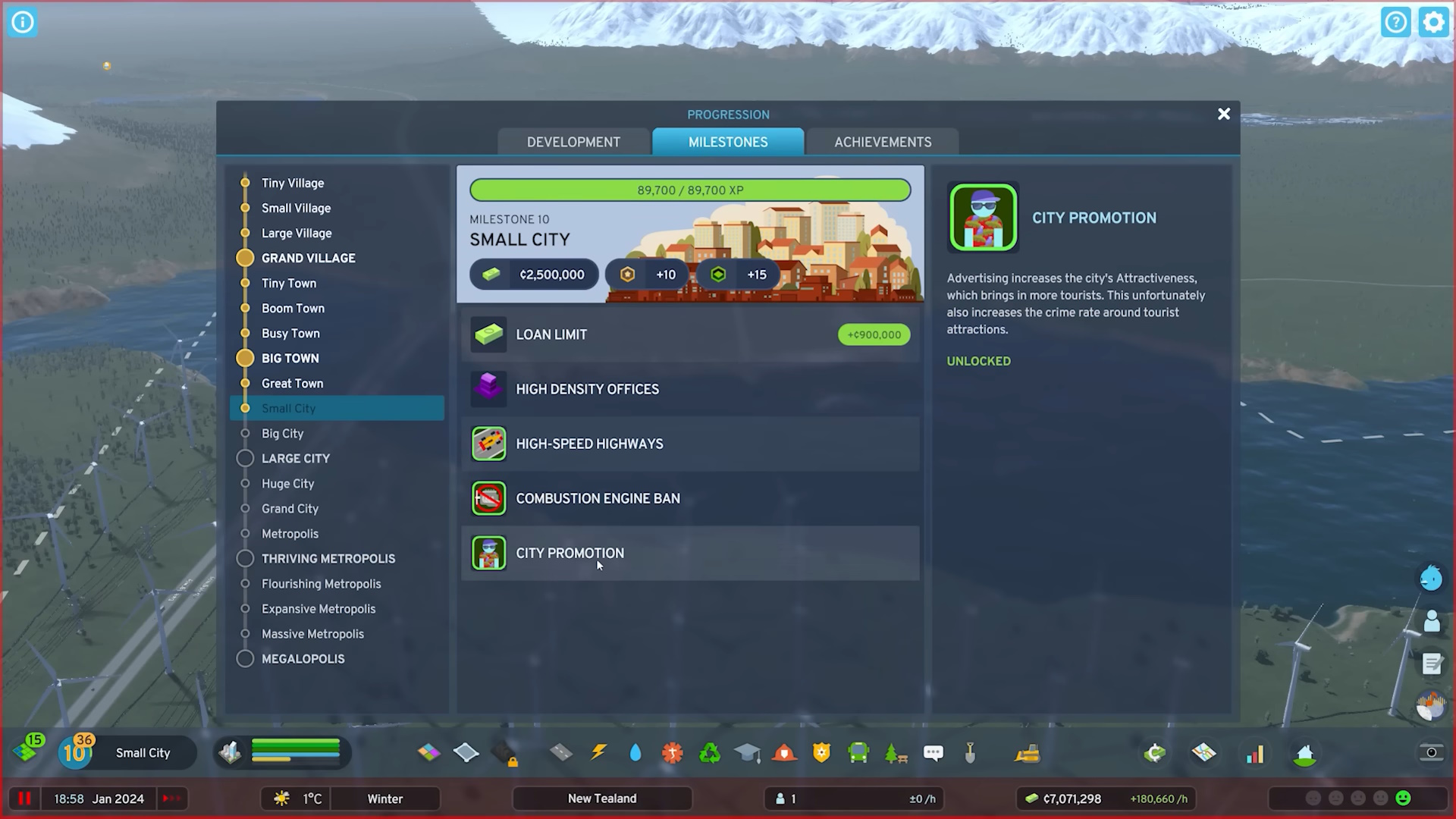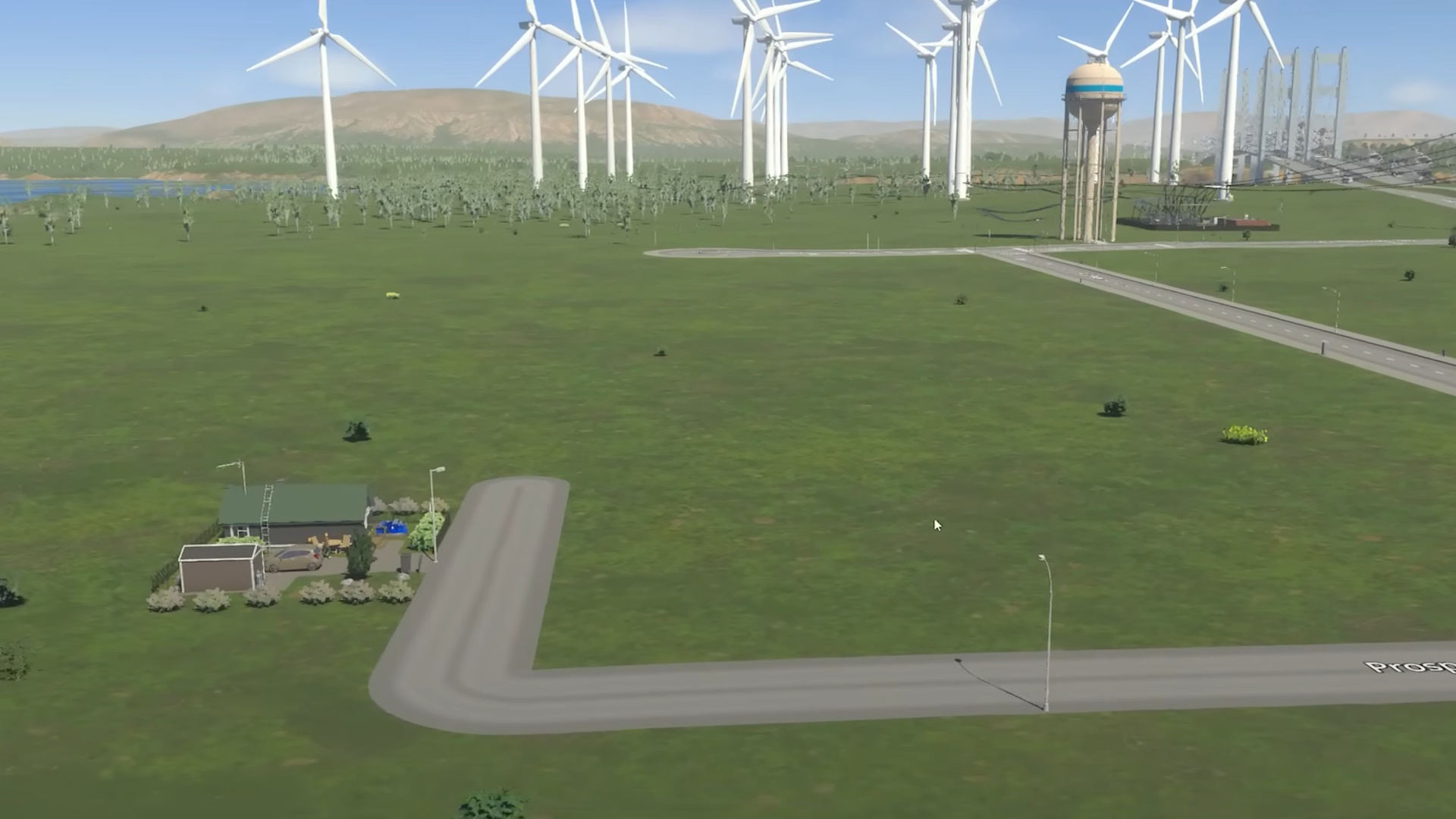My obsession with wind turbines might finally make me a millionaire in Cities: Skylines 2
Opinion | My Cities: Skylines 2 save is a case of so much wind power, so few citizens to consume it.

Cities: Skylines 2 players will be happy to hear that someone already found an exploit for maximising profits in the early game. As it turns out, all you need is wind farming. Not only do they provide clean energy for your citizens, wind turbines also have the potential to leave you drowning in profits.
In the original Cities: Skylines, bolstering those dollar bills in the early game is a fine art. With your starting funds set firmly in the five digits, you have to be pretty selective about the roads and services you place in your city's initial stages. It's easy to get carried away spending tens of thousands on planning road layouts, only to find you've no way to gift your poor citizens electricity.
There are some time honoured tactics for maximising your profits when you start a new city, such as my good friend (and total fascist) Leenton, the city builder extraordinaire laid down for me. I call it the money well slum.
Slumdog millionaire

The premise? Slap down a simple grid with dirt roads and pack all your citizens into it until the tax tab opens up, then rip them a new one with a 13% charge across all zones. Then you can build your city proper just along the highway and watch it slowly engulf your little shanty town. It turns the game into a sad capitalist simulator, for sure, but it will get your funds to a decent level without the need for taking out loans.
Another tactic – one I often use in tandem with the tried-and-true money well – involves the use of wind power. For those who bagged the Green Cities DLC, utilising the cheaper-than-coal alternative of wind turbines in the early game gives you a chance to raise your profit margin while keeping some money back for important infrastructure (like millions of roundabouts). Instead of splashing out on a ₡19,000 coal plant, just invest six grand in a wind turbine and you're good to go.
Sure, you'll be spamming turbines more often than you would a coal plant due to their meagre power output, but hopefully by that point you're in the green. The extra benefit of this, of course, is zero pollution from power plants and happier citizens as a result.
When it comes to CS2, there's a little more leeway in the early game. Your starting funds are set to a much more palatable ₡500,000, and laying out a road network hardly costs a thing. That doesn't mean you're not going to run out of money quickly if you're not careful, however, since services are not only more expensive to place, their upkeep is frankly in the region of extortion. All this is part of a bid for more realism when it comes to the economy.
Sign up to the GamesRadar+ Newsletter
Weekly digests, tales from the communities you love, and more

Thankfully, the devs over at Colossal Order have opted to put wind turbines in the base game, and boy are they overpowered. Not in terms of electrical output, but monetarily. As highly entrepreneurial mayors of our hypothetical cities, we're granted the ability to export overproduced resources and refined goods out of the city, as long as we've made a connection to do so. Generally, the cost of producing and maintaining resources outweighs any profit that might occur, but there's one pretty huge exception.
Included in that list of potential exports is power. While most power generation methods will put you out of pocket, a wind turbine's minimal ₡15,000 cost and ₡5,000/month upkeep means these little money makers are one of the most effective profit generation methods in the early game.
Simply pack a bunch of wind turbines together, zone only a single residential plot with a few services leeching that precious wattage to keep your single settler happy, and you'll be turning a profit in no time. Just remember to connect your money farm up to the world's external power line.
Profit and floss

"Granted it does mean the majority of your map will be overrun with wind turbines for a bit, but leave the game running for a while and you'll be swimming in cash in no time."
If you're wondering how much profit we're looking at, "sixteen wind turbines will generate ₡4,700 of profit per hour." That's according to Spiffing Brit's calculations, who showed off the exploit in their YouTube video that proves, without a doubt, that Cities: Skylines 2 is a perfectly well-balanced game.
Thanks to the fact that simply placing roads and structures advances you toward the next milestone, Spiffing Brit made it all the way to Busy Town – the seventh milestone of the game – in no time, and with only one person living in the city. At that point, he was producing "1,365MW of electricity. This is over the entire power production that a nuclear power plant can manage", and was generating a "monthly electricity net positive of ₡3.3 million". All else considered, the profit figures stood at around ₡60,700 per hour. Once he'd hit the Small City milestone, just three steps above Busy Town, that profit margin had already increased to ₡144,390 per hour. Not bad for a city of one.
Granted, this won't be the way most players choose to start their city, and it does mean the majority of your map will be overrun with wind turbines for a bit, but leave the game running for a while and you'll be swimming in cash in no time. Just make sure to keep your single citizen happy, and pop in to stamp out the odd forest fire with the bulldoze tool, and job's a good 'un.
This exploit also has the added bonus of making your city the greenest (albeit the most boring) city on earth. Hit Small City, though, and you can start encouraging tourism to bolster that profit margin even more. You're welcome. Since the game is still in development, the devs at Colossal Order may yet decide to tweak the cost/upkeep of wind turbines. Here's hoping we get to keep this little eco exploit, though.
Raise your dreams (and tear 'em down) with the best city building games going right now

Katie is a freelance writer with almost 5 years experience in covering everything from tabletop RPGs, to video games and tech. Besides earning a Game Art and Design degree up to Masters level, she is a designer of board games, board game workshop facilitator, and an avid TTRPG Games Master - not to mention a former Hardware Writer over at PC Gamer.



